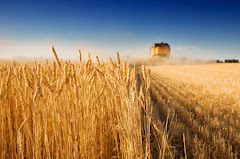Rain in Kansas has slowed down the wheat harvest, as just after it got started things had to be temporarily shut down.
Estimates are farmers will have to wait until the weekend before resuming harvest, which was very spotty across the state.
The largest amount of wheat harvest I heard of was in the Kiowa area, which was able to complete 232,000 bushels last weekend before the rains came.
About 12,000 bushels were completed near Arkansas City before several inches of rain shut that down as well.
Friday, June 11, 2010
USDA Confirms Too Much Wheat
The wheat ending stocks are projected to be at 991 million bushels, according to the latest USDA figures, down a little from May, but irrelevant because of the enormous supply.
Even with the news out of Canada that wheat production is lower because of less acreage planted than originally thought, it's not going to do much to move prices at all.
And there is so much wheat the wet weather keeping farmers from planting their fields won't do anything either.
I talked about this last year, and it continues to puzzle me why farmers don't move out of their wheat planting and into a more profitable crop.
Add to this the increasing number of wheat farmers and production around the world and there is little reason to pursue wheat at this time.
Even with the news out of Canada that wheat production is lower because of less acreage planted than originally thought, it's not going to do much to move prices at all.
And there is so much wheat the wet weather keeping farmers from planting their fields won't do anything either.
I talked about this last year, and it continues to puzzle me why farmers don't move out of their wheat planting and into a more profitable crop.
Add to this the increasing number of wheat farmers and production around the world and there is little reason to pursue wheat at this time.
Labels:
Wheat,
Wheat Prices,
Wheat Production
Tuesday, June 8, 2010
Wheat Woes Continue, Plunge to Three-Year Low
Good weather has resulted in a strong wheat crop, and consequently wheat futures plunged to a 3-year low as harvest in the southern U.S. Great Plains States begins.
Precipitation was the major factor in the bumper yields, as there was four times as much rain in the last month than normal, according to National Weather Service data.
Wheat futures for July delivery fell 3.5 cents, 0.8 percent, to $4.3225 a bushel on the Chicago Board of Trade, after reaching $4.31 a bushel, the lowest price for a most-active contract since April 3, 2007.
With the growing number of wheat farmers around the world and bumper wheat crops, there continues to be little reason prices will increase going forward, and makes you wander why farmers continue to plant the grain, other than government subsidies.
Precipitation was the major factor in the bumper yields, as there was four times as much rain in the last month than normal, according to National Weather Service data.
Wheat futures for July delivery fell 3.5 cents, 0.8 percent, to $4.3225 a bushel on the Chicago Board of Trade, after reaching $4.31 a bushel, the lowest price for a most-active contract since April 3, 2007.
With the growing number of wheat farmers around the world and bumper wheat crops, there continues to be little reason prices will increase going forward, and makes you wander why farmers continue to plant the grain, other than government subsidies.
Subscribe to:
Posts (Atom)
